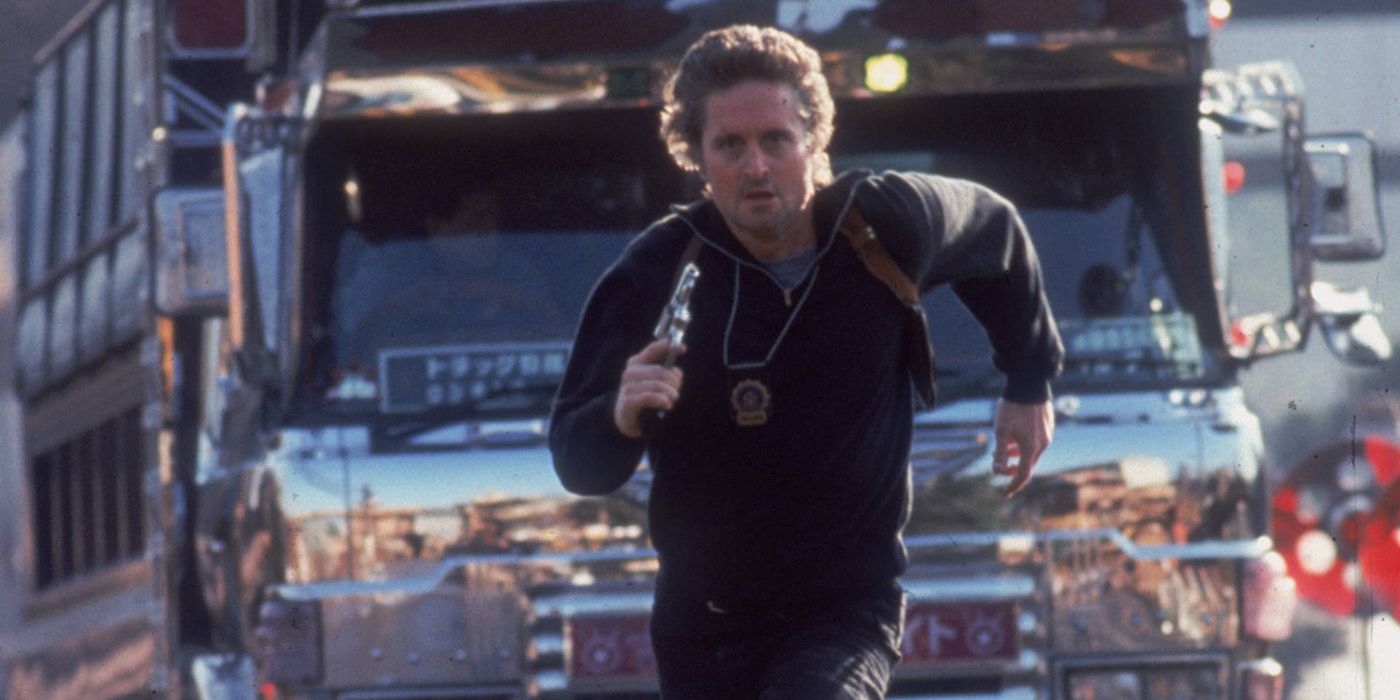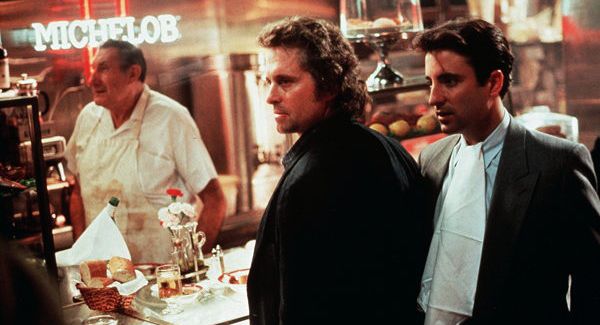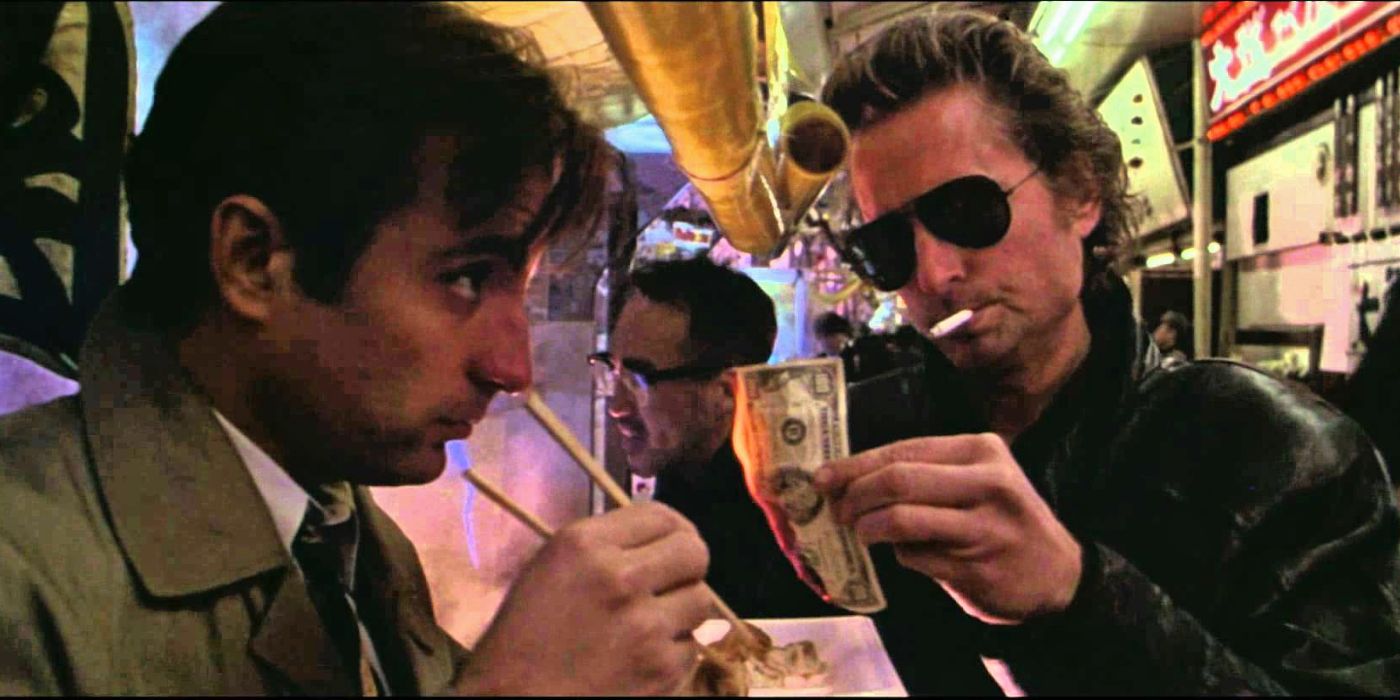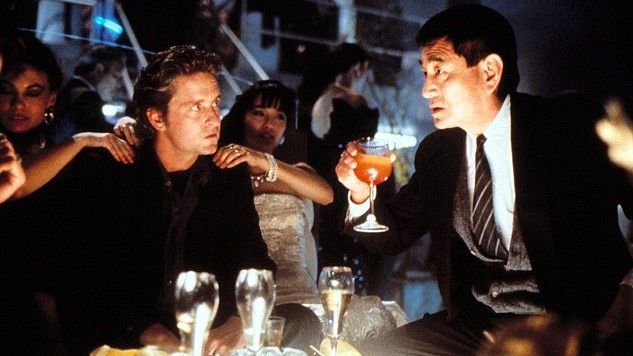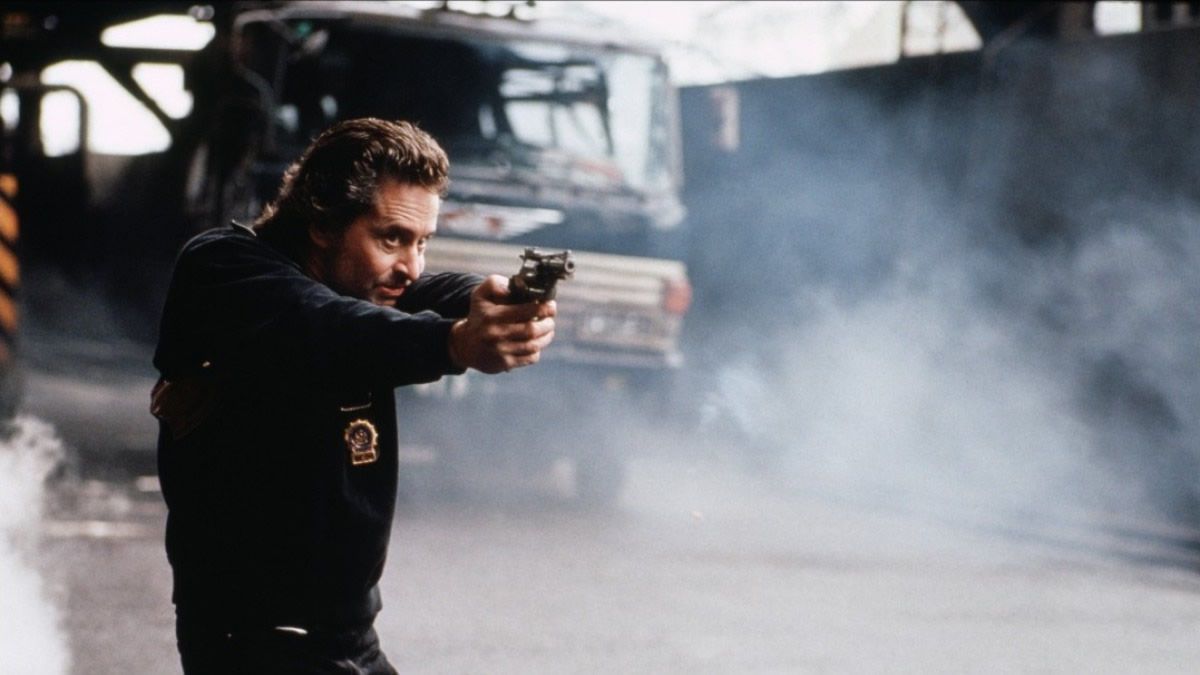Bedazzling visuals will allow a film to get reasonably far in terms of making a memorable impression, and in Black Rain's case, "far" is a considerable distance. With its steady collection of admirers, the film continues to draw praise in some quarters as the years tick by, with its unapologetic thrills mixed with dynamic visual storytelling render it worthy of minor classic status. A rain-slicked gem at the tail-end of the '80s. More than a straightforward actioner, the tale of an under-fire detective's cross-continental journey to deliver a brutal gangster to justice has managed to retain a sense of storytelling zeal — an energy often characteristic of director Ridley Scott's more full-blooded genre salvos. And the movie today occupies an interesting spot in the filmmaker's canon - several years after the cultural watershed that was Blade Runner and right before the classic, emancipatory road movie Thelma and Louise, which was released in the early '90s.
Rain also marks an intriguing spot in the careers of several of its stars. Michael Douglas was fresh off awards success in Wall Street — his Gordon Gekko portrayal attracting much attention and his follow-up role heavily anticipated. This would be the first of several cop parts to follow. The in-form Andy Garcia had recently been a part of the ensemble in Brian De Palma's The Untouchables and was not long after cast in The Godfather Part 3, and the estimable Ken Takakura once again proved himself a star of magnetic power in a part that could have been overshadowed by some of the more prominent characters he was surrounded by. While a few of the arcs in Rain have been done before, they're done particularly adroitly here. Though the narrative is at times far-fetched, the cross-cultural investigative tension is well handled, and the burgeoning friendship between Douglas' tempestuous Detective Nick Conklin and the more measured Assistant Inspector Matsumoto (Takakura) is enthralling to behold due to its committed and talented performers. By the end, you believe in the newly forged mutual respect and the coming together for a shared objective. Black Rain, in all its high-octane plotting, is a shimmering neon-washed flick that radiates a breathlessly adventurous aura.
A Change of Scenery and a Talented Crew
The opening scenes are classically well staged and credit for some of the symbolism employed by Scott from the get-go is absolutely due. While Black Rain kicks into high gear with a motorcycle race through the streets of the city that never sleeps, shortly thereafter, the setting sun over New York viewed through the window of Conklin's apartment captures the city in a moment of quietude, the detective's caffeinated lifestyle reduced to a breath-recapturing moment of self-reflection. Orbed in orangey hues, the shot serves as a striking preemptory image, suggestive of the film's imminent relocation to Japan (literally the land of the rising sun). Day will break anew in a similarly vibrant albeit ultimately markedly different place. The hallmark Scott visual flourish is apparent from the film's early stages, and the movie benefits not just from the surface-level look aesthetic, but the inherent meaning behind a lot of the shots. Of course, when the film moves to Japan, Blade Runner's mise-en-scene shadow looms large, and the sprawling metropolis of Osaka is rendered a neon-lit jungle, both captivating and intoxicating.
It must be said that Black Rain's success as sensory tour de force is due to the combined efforts of a powerhouse creative contingent. Alongside the estimable director and cast, which also includes Kate Capshaw as a shrewd expatriate who drip-feeds information to Conklin, is composer Hans Zimmer, who weaves a beautiful musical tapestry throughout the picture that truly reaches its zenith at the film's conclusion. Cinematographer Jan de Bont — who went on to helm a couple of successful genre vehicles in the '90s — is a key tool in helping make Osaka become a living, breathing, thrilling character within itself in the film. Perhaps de Bont harnessed some of Scott's energy employed here and used it to make runaway hit Speed in 1994. Black Rain thereby contains a lot of strong players within its orchestra, all of whom contribute to making the film work through taking a tried, test and proven formula and giving it an Eastern shake-up via transplanting the action to Japan. As a result of the contextual switch, room for increased psychological intrigue is provided as differing jurisdictions lock horns in the pursuit of a common goal.
Energetic Plotting
While the cop movie template is firmly there and echoes of it certainly feel familiar, the introduction of the cross-cultural manhunt give the film a distinct and razor-sharp edge. Following the aforementioned opening, which creates a texture of calm before an impending storm, it's suggested Conklin has drawn the attention of an IAD investigation for an alleged involvement in the seizing of funds after a drug bust. From there, we witness his life from the outskirts. He is divorced, faces accruing expenses and bills, and has a child with whom he'd like to be closer. His relationship with the bubbly young detective Charlie Vincent (Garcia) is iron strong however, and their camaraderie adds levity to the murky pot being stirred. When they apprehend a ruthless gangster, Yusaku Matsuda's Sato (who brazenly attacks a patron at a NYC restaurant), they are asked by their superior (John Spencer) to escort the prisoner to his native Japan, for as it turns out, Sato is a member of the Yakuza.
Not the first Hollywood film to tackle the topic —1974's The Yakuza did so in atmospheric neo-noir fashion — Black Rain conversely almost exclusively takes place in Japan from the moment Vincent and Conklin touch down in Osaka with the brooding Sato in tow. Upon landing, the two are swindled by some of Sato's offsiders masquerading as cops, and he is reclaimed by the streets to the chagrin of the two NYPD officers. It is there that Conklin, in his state of manic fury and frustration, is formally introduced to the real local officer who will head up the case, Takakura's Matsumoto. The placidity of Mas, who strives to uphold the principles of his department, versus the rough-hewn energy of Conklin provide much of the film's drama from this point — and the gradual compromise the two men make in order to bring Sato and his gang members in give the movie its interpersonal dramatic ballast. Initially, the relationship between Matsumoto and Conklin is intense, as the former moves at a deliberate pace whereas the latter seeks immediate results and will go hell-for-leather in order to get there.
International Noir Feel and Drama To Match
The gradual evolution from heated tension to reluctant cooperation to bona fide companionship is an aspect of the film not as often discussed.Their relationship is the core of all resultant events, and powerfully depicts the coalescence and ultimate embracement of two wholly different styles, cultures, temperaments and modes of operating. A tribute to the potency of partnership. In fact, it is Vincent who makes a more endearing impression on Matsumoto to begin with, via Garcia's personable and mediatory portrayal, and this warm impression is paramount to Matsumoto's ultimate reckoning with Conklin. For around the film's midpoint, Vincent meets a shocking fate as the din of engines roar. As the action escalates and as the extent of Sato's operations become apparent, including an elaborate money counterfeiting ring, the stylistic choices run in concert with the physical and psychological action.
The early investigative scenes are stylistically similar to '90s Fincher in their shadowy noir stylings. Here, the interiors house a silhouetted mystique evocative of the era, and the street scapes wind and run away, adding mystery to the chaos. The camerawork is sublime. As Conklin and Vincent prod at a bill they suspect may be ersatz, the camera pans down dramatically, dropping like a spider from somewhere around the roofs to a midrange shot of the two at a restaurant table back-dropped by the dramatic city. Likewise, the finale, wherein Conklin decides to defy authorities and remain in Japan to apprehend Sato on his own terms, is exciting. Having convinced a suspended Matsumoto to accompany him, and having made a deal with Sugai — another underworld figure who has his own reasons for avenging Sato — the drama unfolds in the rice fields. With spitting rain and a final confrontation in the sludge that results in some actual restraint exercised by Conklin, the excitement is always palpable.
Multifaceted Action
Given life by a veritable filmmaker and cast, Black Rain is a wholly exciting film underpinned by a strained relationship turned unlikely bond. There is an enduring sense of kinetic energy and movement to the picture, while also containing more somber and symbolic moments to offset the action — visual elements that link the two disparate locations together. An unapologetic genre film with style to spare, its heart nonetheless beats rhythmically, and wrapped within its arresting action-fueled neo-noir atmosphere is a psychological drama ripe with age-old necessities. Compromise and respect, acceptance, forging strong ties in times of adversity; more than a few themes course through the Rain and its overpoweringly awe-inspiring visuals.

